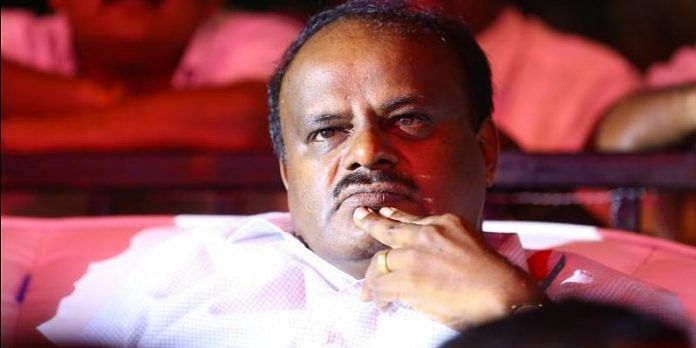Kumaraswamy’s base–of several Vokkaliga subcastes-in a rapidly globalizing Bengaluru region, with its inexhaustible new wealth, enabled JD(S) to thrive.
“I will not be a kingmaker. I will be the king!” H.D. Kumaraswamy insisted vehemently and relentlessly throughout the 2018 Karnataka assembly election campaign.
Realizing that his party had to come to power at any cost, he campaigned with a desperation and ferocity, which neither of his national rival parties could match. He gamely battled allegations that JD(S) was BJP’s B team. JD(S) had already been weakened by persistent dissidence in recent years. Seven influential MLAs even crossed over to Congress just before the elections. These former allies of Kumaraswamy were unhappy with the political strategies of their erstwhile leader.
Moreover, he had to manage political ambitions of his own family members, many of whom wanted to contest elections.
As election results arrived Monday, Kumaraswamy was probably the most satisfied person. Unable to either attain majority or emerge as the single largest party, Congress immediately telegraphed its intention to back JD(S), thus allowing Kumaraswamy to put in his bid to become the next chief minister of Karnataka.
Hours later, he stood silently outside the Raj Bhavan in Bengaluru, as Congress leaders talked to the press. Next to him was his bete noire and the outgoing chief minister, Siddaramaiah, whose electoral career Kumaraswamy had, for all practical purposes, ended just moments ago.
When the election season began six weeks ago, Kumaraswamy personally targeted Siddaramaiah and spent more than a week in the Chamundeshwari constituency at the beginning of the campaign itself. He visited every village and colony astutely exploiting the intense Vokkaliga anger against Siddaramaiah. That start was to provide momentum for his campaign across the Old Mysuru region, his party’s traditional stronghold.
By the voting day, he had roused the Vokkaligas to turn out in large numbers, leading to more than 80% voting in southern Karnataka. Siddaramaiah’s huge defeat from Chamundeshwari was accompanied by significant losses for Congress in this region.
Fifty eight year old Haradanahalli Devegowda Kumaraswamy often describes himself as an accidental politician. He is the third son of former prime minister H.D. Deve Gowda but unlike his older brother H.D. Revanna, Kumaraswamy had consciously stayed away from politics. He had substantial business interests, primarily in the fields of film production and distribution. A great fan of the legendary Kannada actor Raj Kumar, Kumaraswamy even now talks about his love for movies and their influence on him. In particular, he often refers to the Kannada classic ‘Bangaarada Manushya’ (golden man) as the film which showed him how to be a human being. Made in 1972, this Raj Kumar movie portrayed an ideal man who puts his family’s welfare above that of his own personal happiness. Kumaraswamy was even briefly married to a popular film actress between 2006-10. His son, Nikhil Kumaraswamy, is an upcoming Kannada actor.
Kumaraswamy entered politics in 1996, when he won the Kanakapura Lok Sabha constituency. His foray into national politics coincided with his father, H.D. Deve Gowda’s becoming the prime minister.
Although a late entrant, Kumaraswamy quickly developed political ambitions and began to expand his family’s influence into districts around Bengaluru. From the early days, he never entered into the family pocket borough of Hassan or neighbouring Mandya and Tumkur districts, leaving those areas to other members of his family or trusted old followers of Deve Gowda.
Kumaraswamy’s focus on regions around Bengaluru, particularly Bengaluru rural, Ramanagar, Chikkaballapur and Kolar, enabled the Gowda family to expand its influence from the south interior heartland of the old Mysuru region to all of southern Karnataka. Since 1996, he has contested from this region itself, getting elected to Parliament twice and to the state assembly four times.
In a notable political accomplishment, Kumaraswamy successfully brought into the JD(S) fold several Vokkaliga subcastes from the above mentioned districts, thus forming a larger Vokkaliga alliance under his leadership. In particular, this new political base in a rapidly globalizing Bengaluru region, with its inexhaustible new wealth, enabled Janata Dal (S) to thrive in Karnataka’s politics over the past two decades. Another positive for JD(S) has been his ability to connect with the youth and address their aspirations. His party men even address him as Kumar Anna (elder brother).
Kumaraswamy has never hid his political ambitions or his willingness to do anything to achieve political power. In fact, that attribute led to the most controversial political move of his two decade old career, namely his alliance with BJP in 2006, much to his father’s consternation. Kumaraswamy became chief minister for 20 months as part of a power sharing agreement with B.S. Yeddyurappa but reneged on his promise to back BJP once his tenure was over. Kumaraswamy’s refusal to allow BJP is often seen as the primary reason for BJP’s victory in 2008 state assembly elections.
Now Kumaraswamy stands ready to occupy chief minister’s office on the third floor of Vidhana Soudha.
How will he govern? If we were to go by past experience, his approach will be populist and theatrical.
Will his alliance with Congress remain stable? If he succeeds in forming the government, it should survive at least until after the Lok Sabha elections next year. Only astrologers will be able to confidently predict what might happen afterwards.
Prithvi Datta Chandra Shobhi is a social historian and political commentator. At present, he teaches history at the Karnataka State Open University, Mysore.



